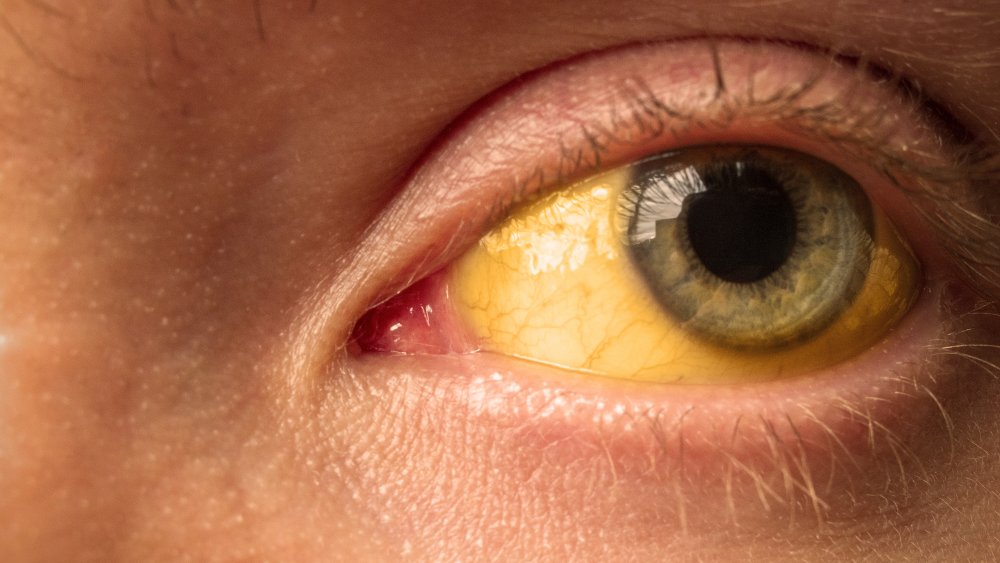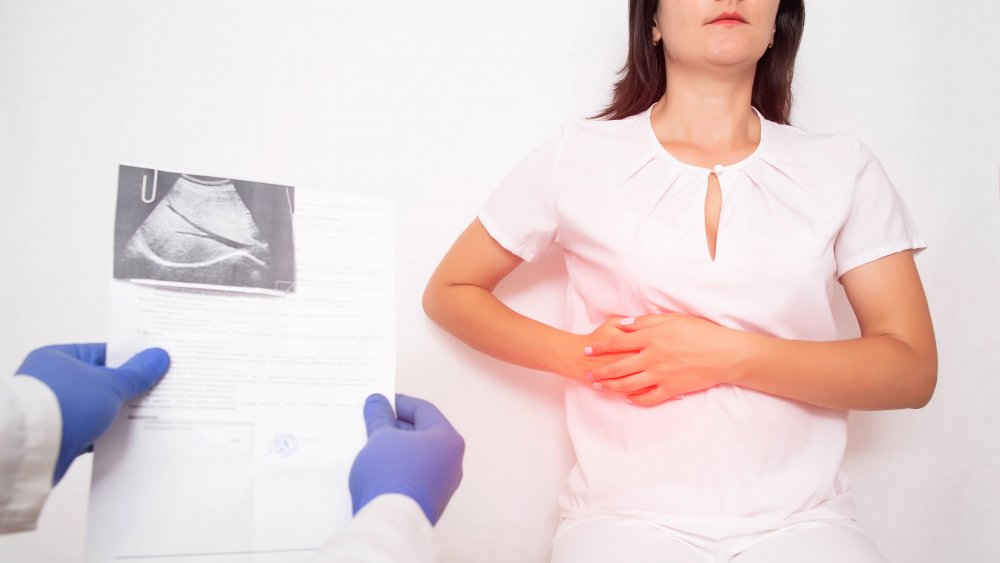What It Really Means When Your Eyes Turn Yellow
They say that the eyes are the window to the soul, but they can also be vital clues into what's going on inside your physical body. In fact, the number of things your eyes can reveal about your health may surprise you. For example, the most common cause of yellow eyes is because you've been hit with a spell that is turning you into a cat. (Okay, not really.)
Actually, according to Healthline, yellow eyes can be a sign of jaundice, a buildup of a yellowish substance called bilirubin that forms when hemoglobin breaks down after carrying oxygen throughout your body. In a healthy, functioning body, bilirubin is sent from the liver to the bile ducts and lastly the intestines before being excreted with the rest of the body's food waste. If this process is disrupted for one of a number of reasons, the bilirubin accumulates within the body, causing the skin and the whites of the eyes, known as sclera, to turn a sickly yellow.
If you're experiencing yellow eyes or skin, you might be suffering from one of a number of health conditions that are causing the liver, gallbladder, and/or pancreas to function improperly. Understanding how these organs clear the body of waste materials, and how to notice the signs that they aren't doing so, could help you identify the presence of a severe or even deadly disease.
Yellow eyes could mean you have one of these medical conditions
Your eyes may be yellow due to a number of conditions affecting the liver, such as cirrhosis, or scarring due to excessive alcohol use, infection, cancer, or hepatitis. Certain genetic conditions affecting the liver can also cause cirrhosis and yellowing of the eyes. If you experience this along with nausea, loss of appetite, sudden weight loss, or prolonged and unexplained fatigue, you should definitely ask a doctor about your symptoms.
The bile produced by the liver is sent on to the gallbladder, which when functioning properly, releases the bile into the intestine to help digest food. If a gallstone, cyst, tumor, or inflammation is blocking this process from occurring, however, you could see your eyes turn yellow and also experience fever, chills, abdominal pain, and/or unexplained weight loss.
The pancreas is also involved in waste removal, and can cause a buildup of bilirubin as a result of infection, inflammation, obstruction, or pancreatic cancer. It is much rarer to experience jaundiced eyes from pancreatic conditions than from those affecting the liver and gallbladder. Yellow eyes can also be caused by blood disorders that affect how your red blood cells break down. Sickle cell anemia is one such condition. According to Johns Hopkins, another type of anemia, called hemolytic anemia, caused by taking certain medications like over-the-counter pain medications, sulfas, antimalarials, and penicillin, can cause yellow eyes, as can an incompatible blood transfusion.
When your eyes turn yellow from catching too many waves
There is another condition that can cause a different type of yellowing of the eye, one that is more patchy, rather than a yellowing of the sclera. According to the American Academy of Ophthalmology, the eye can turn yellow due to irritation from the ultraviolet light of the sun in combination with irritants like dust and wind. This causes a small yellow patch to grow out of the conjunctiva, the transparent film that covers the sclera, and it's called a pinguecula. If you allow a pinguecula to go untreated, it can become inflamed and turn red, a condition called pterygium. Additionally, it can end up growing over part of your cornea and affect your vision. Pterygium is also called surfer's eye, but you don't actually have to hang ten to get it. Still, surfers are at a greater risk, according to All About Vision, as they face the double threat of the sun's UV rays from above, as well as their reflection off the water.
While they aren't cancerous, pinguecula and pterygium can still become serious conditions that could permanently affect your vision. The best way to protect yourself is to wear sunglasses and hats to protect your eyes from the sun, and use glasses or goggles in windy conditions to avoid dust getting in them. Also use eye drops when your eyes dry out to flush them clean of foreign objects.


